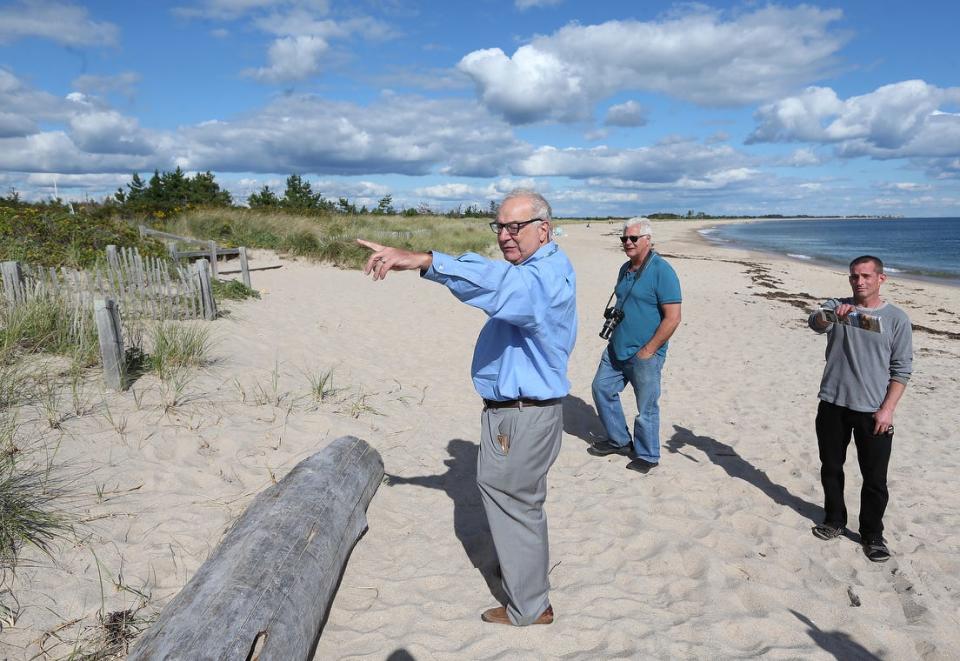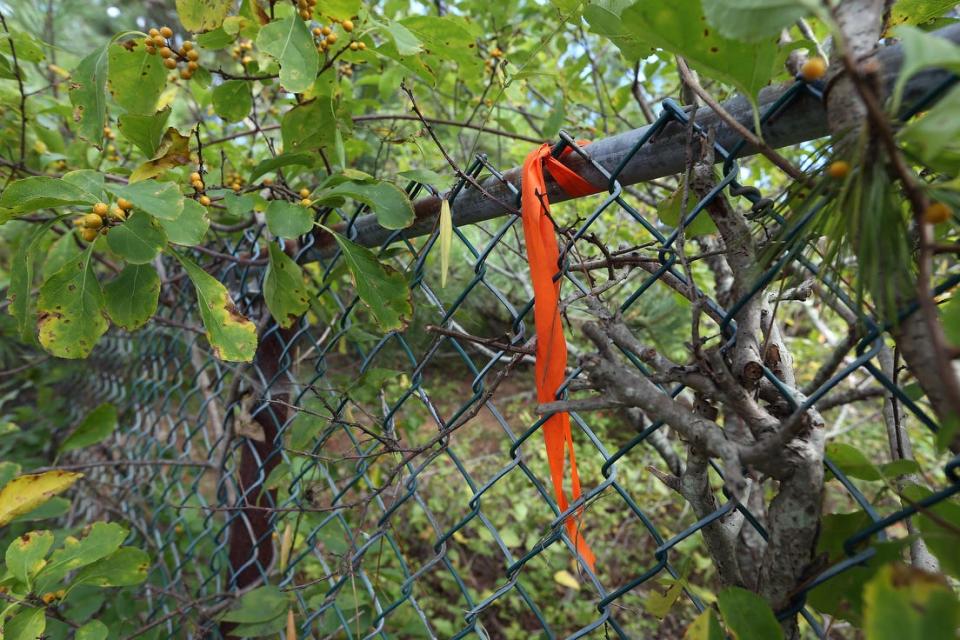Will donors to beach-access fundraiser be deposed by fire district? Why ACLU is objecting.
WESTERLY – Shoreline access advocates who contributed to a GoFundMe page have been alerted that they are considered potential witnesses in an ongoing legal fight and may be deposed by attorneys for the Weekpaug Fire District, prompting a strong rebuke from the Rhode Island chapter of the American Civil Liberties Union.
The fundraiser, titled "Restore our Spring Avenue Right-of-Way," has raised more than $13,000 for the ongoing fight to open up public access to Quonochontaug Barrier Beach.
The Weekapaug Fire District, which doesn't fight fires and functions more like a homeowners association, controls the only pathways onto the 1.7-mile beach and uses security guards to keep out the public during the summer.
Local activists believe that the public should be able to access the beach using a right of way known as Spring Avenue Extension, which has been blocked for years. The Fire District disputes the notion that Spring Avenue is a public right of way, and the matter is pending before the Coastal Resources Management Council.
What the Fire District's lawyers said in letters to GoFundMe donors
Over the last week, some GoFundMe donors received letters from law firm Locke Lord, which represents the Weekapaug Fire District.
"The Spring Avenue Extension CRMC matter is in the discovery phase, and individuals with relevant information have and will be deposed in the near future," the Dec. 1 letter from lawyer Joseph Farside states. "It has come to our attention that you are a donor to the Restore our Spring Avenue Right-of-Way cause through Ms. Caroline Contrata's fundraiser established on gofundme.com.
More: His quest? Walk RI's entire coast- But private property and blocked access are a challenge
"It should be evident that a person’s donation of money to a cause that they have a strong interest in supporting, including one involving legal proceedings, provides absolutely no basis to believe that the donor has any knowledge of evidentiary value about the case so as to warrant their deposition," Brown wrote.
"Based on your donation to Ms. Contrata's fundraiser, you have been identified as a potential witness in the Spring Avenue Extension CRMC matter," the letter goes on to state. "We would like to interview you in the near term and, potentially, depose you. If you have any information that you would like to disclose to us voluntarily, that would assist with accelerating the discovery process."
"Please be also advised that you may be called to testify, by subpoena or otherwise, in this matter at anytime," it concludes.

ACLU says there's 'absolutely no basis' to assume donors have evidentiary knowledge
The letters sent out to GoFundMe donors could have a chilling effect, Steven Brown, the executive director of the Rhode Island ACLU, wrote in a letter to the Weekapaug Fire District on Thursday.
Brown asked the Fire District to withdraw the letters, saying that the ACLU is "deeply concerned that these letters have the effect, if not the intent, of chilling the exercise of free-speech and freedom-of association-rights of people interested in shoreline access issues."
He added that it was hard to imagine how contributing financial support to the cause "could transform the individual donor into a person properly subject to be called as a witness at the proceeding."
In fact, he said, "singling out these donations as a justification to threaten the contributors with compulsory process and interrogation under oath could easily be interpreted as an attempt to chill core First Amendment activity."
People who wish to make a donation may hesitate to do so because they fear "being sucked into the legal dispute itself" and needing to take time off work, facing "intimidating questioning" and even needing to hire their own legal counsel, he said.
Farside did not immedately respond to a request for comment on Friday. In an emailed statement, the Weekapaug Fire District said that the intention was simply to provide people who are interested in the case with an opportunity to share relevant information.
"We share the ACLU’s commitment to transparency and want to ensure that anyone who may be interested in this case has the opportunity to share what they know," the statement said. "We contacted individuals who made their donation information public through the Go Fund Me because they are meaningfully engaged in the issue and may have information that is relevant to the case."
More: Coastal homeowners want to stop enforcement of new RI beach access law as lawsuit plays out
Why advocates are raising money for the Spring Avenue case
Contrata, the Westerly resident who created the fundraiser in May, is petitioning the CRMC to designate Spring Avenue as a public right of way. She is being represented by Michael Rubin, a former assistant attorney general, and New England School of Law Professor Sean Lyness, who both are working on a pro bono basis.
Rhode Island Attorney General Peter F. Neronha has also been granted permission to intervene in the case, in favor of opening up public access.

Proving that Spring Avenue is a public right of way requires gathering reams of evidence. That work is being carried out by volunteers who have incurred some expenses, such as printing maps that can be used as exhibits in a hearing, Contrata explained on the fundraiser page.
Additionally, she said, there are witnesses who used the right of way before it was blocked but cannot testify in person at a hearing because they are too old or live too far away. To collect their testimonies, attorneys must travel out of state to conduct a deposition with a stenographer and videographer.
So far, the fundraiser has received more than 200 donations – some of them from people who contributed after learning about the law firm's letters.
Any leftover funds will be donated to Save The Bay, "which has been extremely supportive," Contrata wrote in a November update.
This article originally appeared on The Providence Journal: Beach-access donors told they could be deposed by fire district

